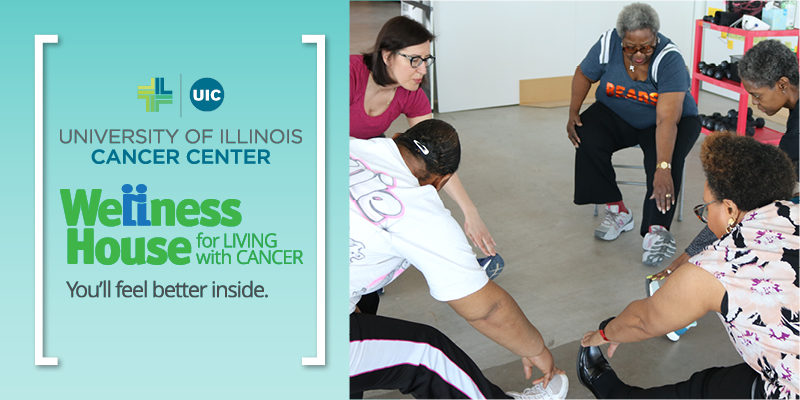
Looking through a brochure at her doctor’s office, Araceli read with great interest the offerings Wellness House provides cancer patients such as herself: exercise and nutrition courses, stress management lessons, and support groups and counseling, among others. The medication she was taking to combat breast cancer often left her lethargic, unusual for someone who was so active and physically fit. The programs, she believed, could help her regain the vitality she was used to before being diagnosed with breast cancer.
Then something unexpected occurred just as quickly as her cancer diagnosis: COVID-19.
“The new normal” is a phrase that has often been heard since the first case of the virus was reported in the United States on Jan. 20, 2020. Health officials believe the virus can be contained by wearing masks and maintaining a safe distance of six feet from others, and many businesses and organizations have altered their operations to comply. When first learning of the pandemic, Wellness House, located in suburban Hinsdale and at Mile Square Health Center in Chicago, quickly transitioned to online courses so to allow cancer survivors like Araceli to “fully live life with cancer and beyond,” a philosophy of the agency.
Wellness House services were primarily provided to cancer patients and their families at its Home of Hope in Hinsdale. For the last three years, the nonprofit has been expanding services to partner locations. Susan Hong, MD, MPH, FACP, director of the Program for Innovations in Cancer Survivorship at the UI Cancer Center, and UI Cancer Center member Marian Fitzgibbon, PhD, played an integral role in the UI Cancer Center and UI Health’s 2019 collaboration between Wellness House and Mile Square, a Federally Qualified Health Center.
“Our last in-person class was March 13, but none of our classes were interrupted by the pandemic,” said Sherri Wick, LCPC, Wellness House’s community engagement manager for its Chicago programs. “It was overwhelming to solve the safest and most secure computer platform to conduct our courses. We had never done anything like this before, but the staff did an incredible job.”
Transportation to Wellness House is often a challenge for many survivors, but the online courses have alleviated that problem, Wick said. The majority of the classes are held live online daily, and participants are sent an email reminding them when to watch on their computer. The courses are also accessible through a smart phone, where “you don’t have to see it, but just want to listen,” Wick said. Wellness House is also investigating producing recordings of some of the courses so survivors can watch at any time.
“We’re attempting to find the safest computer platform that complies with all HIPAA regulations,” Wick said. “We feel the recordings are another way for more individuals to get involved.”
More than 21,000 online visits have been documented since the programs went virtual, Wick said. The free courses, which also include book clubs, Pilates, meditation and several support groups, among others, have brought a newfound audience, allowing survivors to attend who previously couldn’t because of their schedule.
“We have had people reaching out to us from different states and even different countries,” Wick said. “This has been a powerful way to touch people. It’s going to be exciting to see when everything reopens, to see this new Wellness House.”
Araceli (who requested that her last name not be used) was thankful she read the Wellness House brochure in her doctor’s office. Having to navigate an unfamiliar healthcare system often left her feeling depressed and alone. Upon learning about the organization, she decided to drive from her home in Chicago’s Gage Park neighborhood to Hinsdale to learn more. She left her initial visit feeling uplifted, and decided to start small, enrolling in a chair yoga class in hopes of joining other courses should she find it enjoyable.
“It’s been good for me,” Araceli said of the exercise class. “I have a lot of family obligations and haven’t been able to work. Cancer has totally changed my life.”
Araceli wanted to attend each exercise course, but the pain from the surgery she underwent in August 2019 to remove the cancerous tumor and 10 weeks of radiation therapy was often too unbearable for her to leave her home. Not only were physical activities challenging, but she was also experiencing mental fatigue, having to navigate numerous agencies that she relied on to assist her in her treatment.
“Everything was a struggle,” Araceli said. “I spoke to my doctor about the class and how I really wanted to go but sometimes couldn’t. He said not to worry, that I needed to take care of myself first. I stopped going to the class and I let Sherri know about my situation. She and my yoga instructor were very supportive. They told me just come when you are able. Then the pandemic hit and the classes went online, which has been helpful for me.”
Although Araceli claims she is “not really tech savvy,” she has regularly managed to participate in the online classes. She sets up the computer in her living room to follow along with the instructor, using a chair and pillows to help with her exercises. Araceli hopes the movements will aid her in regaining her strength.
“The classes have been very beneficial to me,” Araceli said. “Sometimes we work on shoulder strength, and other times on our core and sometimes our legs. My doctors told me I need to stay active, and after the exercises I feel good physically and mentally. I feel my body enjoys it and I feel relaxed. During that hour I’m focusing on myself, and nothing else. I would certainly recommend the class to other survivors.”
To learn more about Wellness House and their offerings, visit www.wellnesshouse.org
